
It’s said that when you drive a car off the dealership for the first time it instantly loses 30% of it’s value. Ever wondered why that is? After all, it’s not like the car has seen significant damage or degradation in those 2 minutes. The reasons are more economically based and like most things economical that means it’s complicated, this article will elaborate.
What is Depreciation?
This loss in value is what’s known in financial terms as “depreciation”, it’s not exclusive to cars but cars are a very common example.
The exacts of that 30% figure will change depending on the make and model of the car but the idea of it is roughly true, Cars will lose around half of their original value in the first few years of ownership. A good rule of thumb is around 20% over the first year of ownership and then 10% for the next few years with the percentage continuing to get smaller after that.
Why Does Depreciation Happen?
Why does depreciation happen? There’s an obvious answer to this question and then there’s the real answer to this question. Let’s tackle the obvious one first. Car’s are not permanent, they degrade overtime, the bodywork rusts, the engine starts to malfunction, cars will overtime become less efficient and will eventually stop working entirely, that’s probably the reason for depreciation right?
It’s not not a reason, but clearly this doesn’t explain everything, if it did then the majority of depreciation would occur late into the cars life span, not in the first few years, that’s when the car is at its best.
The truth is, depreciation is not reflective of the actual value of the car, if you can even assign a monetary value to that, it’s reflective of how much you can sell the car for. The reason for that 30% drop when you drive off the lot has nothing to do with the car itself, and everything to do with the stigma around “Used cars”.
Used car’s, especially relatively new used cars, are most likely completely comparable to a new version that’s been sitting on a lot for a year, especially if it’s been thoroughly cleaned beforehand, but that’s not the idea people have about them. “Used” is a signifier of less worth in the car market.
There are some other factors too, like how new models don’t stay new for long as the newer version rolls out within the next year, another thing which will reduce resale value, but the primary push of depreciation in the first year is the fact that the car is unavoidably marked as “used” and there’s nothing to be done about it.
Interestingly this idea that something being used makes it worth less isn’t universal. It does apply to the likes of thrift shops for clothes or electrical appliances, but it doesn’t take effect for things like houses, which are an asset which appreciates overtime instead.